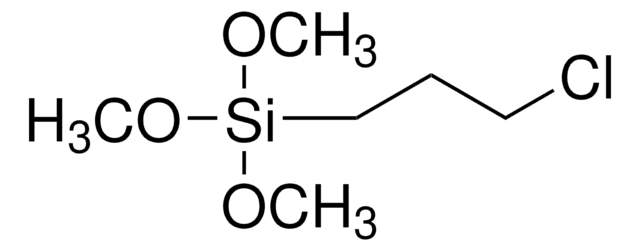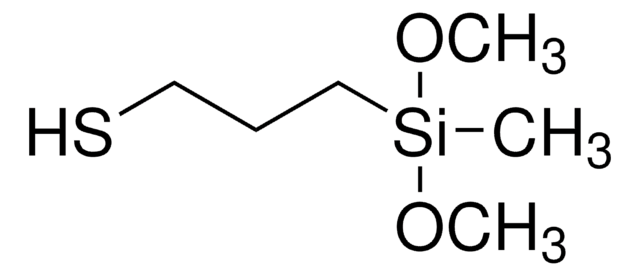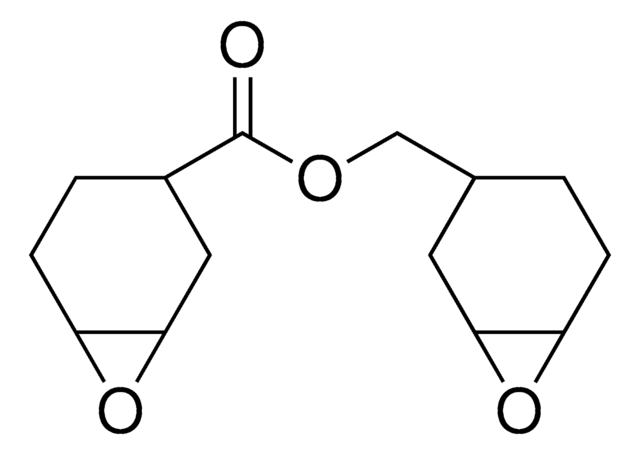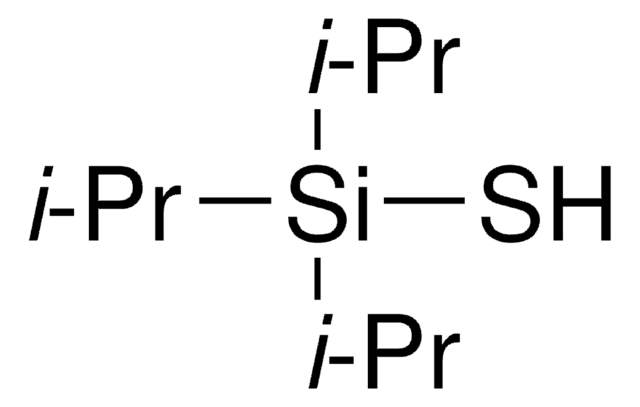175617
(3-Mercaptopropyl)trimethoxysilane
95%
Synonym(s):
3-(Trimethoxysilyl)-1-propanethiol
Sign Into View Organizational & Contract Pricing
All Photos(4)
About This Item
Linear Formula:
HS(CH2)3Si(OCH3)3
CAS Number:
Molecular Weight:
196.34
Beilstein:
2038119
EC Number:
MDL number:
UNSPSC Code:
12352103
PubChem Substance ID:
NACRES:
NA.23
Recommended Products
Assay
95%
form
liquid
refractive index
n20/D 1.444 (lit.)
bp
213-215 °C (lit.)
density
1.057 g/mL at 25 °C (lit.)
storage temp.
2-8°C
SMILES string
CO[Si](CCCS)(OC)OC
InChI
1S/C6H16O3SSi/c1-7-11(8-2,9-3)6-4-5-10/h10H,4-6H2,1-3H3
InChI key
UUEWCQRISZBELL-UHFFFAOYSA-N
Looking for similar products? Visit Product Comparison Guide
General description
(3-Mercaptopropyl) trimethoxysilane (MPS) is predominantly used as a precursor for silica.
(3-mercaptopropyl)trimethoxysilane (MPTMS) is an organosilane with a thiol group, which can be used as a self-assembled monolayer (SAM). It can be used as a conjunction reagent to immobilize a variety of nanoparticles.
Application
MPTMS can be coated with TiO2, CeO2 and La2O3 for protection against corrosion on quaternary bronze in urban atmosphere. It can also be used as a silica nanofluid (NF) to modify the surface of berea sandstone to improve the enhanced oil recovery (EOR) area in the petroleum industry. MPTMS forms composites with kaolin, that can be used as an absorbent for the removal of heavy metals from wastewater. MPTMS can form a bilayer with multiwalled carbon nanotubes (MWNTs) on gold electrodes which can be used to study the electrochemical properties of fluphenazine.
Signal Word
Warning
Hazard Statements
Precautionary Statements
Hazard Classifications
Acute Tox. 4 Oral - Aquatic Chronic 2 - Skin Sens. 1
Storage Class Code
10 - Combustible liquids
WGK
WGK 2
Flash Point(F)
204.8 °F - closed cup
Flash Point(C)
96 °C - closed cup
Personal Protective Equipment
dust mask type N95 (US), Eyeshields, Gloves
Choose from one of the most recent versions:
Already Own This Product?
Find documentation for the products that you have recently purchased in the Document Library.
Customers Also Viewed
Eduardo Reátegui et al.
Nature communications, 9(1), 175-175 (2018-01-14)
Extracellular vesicles (EVs) carry RNA, DNA, proteins, and lipids. Specifically, tumor-derived EVs have the potential to be utilized as disease-specific biomarkers. However, a lack of methods to isolate tumor-specific EVs has limited their use in clinical settings. Here we report
XPS and electrochemical evaluation of two-dimensional organic films obtained by chemical modification of self-assembled monolayers of (3-mercaptopropyl) trimethoxysilane on copper surfaces.
Sinapi F, et al.
Materials Science & Engineering. C, Materials For Biological Applications, 22(2), 345-353 (2002)
Lining Ju et al.
Scientific reports, 7(1), 14185-14185 (2017-10-29)
Conventional approaches for studying receptor-mediated cell signaling, such as the western blot and flow cytometry, are limited in three aspects: 1) The perturbing preparation procedures often alter the molecules from their native state on the cell; 2) Long processing time
Hydrolysis and condensation of self-assembled monolayers of (3-mercaptopropyl) trimethoxysilane on Ag and Au surfaces."
Thompson WR, et al.
Langmuir, 13(8), 2291-2302 (1997)
Synthesis and luminescence of (3-mercaptopropyl)-trimethoxysilane capped CdS quantum dots
Wuister SF, et al.
Journal of Luminescence, 102, 338-343 (2003)
Our team of scientists has experience in all areas of research including Life Science, Material Science, Chemical Synthesis, Chromatography, Analytical and many others.
Contact Technical Service










![Bis[3-(triethoxysilyl)propyl] tetrasulfide technical, ≥90% (NMR)](/deepweb/assets/sigmaaldrich/product/structures/242/790/625f5cba-32bd-4acf-a3be-e119e9cf844f/640/625f5cba-32bd-4acf-a3be-e119e9cf844f.png)

![[3-(2-Aminoethylamino)propyl]trimethoxysilane technical grade, ≥80%](/deepweb/assets/sigmaaldrich/product/structures/149/508/f87a9a89-f138-4c5e-9fe0-6561914241c3/640/f87a9a89-f138-4c5e-9fe0-6561914241c3.png)
